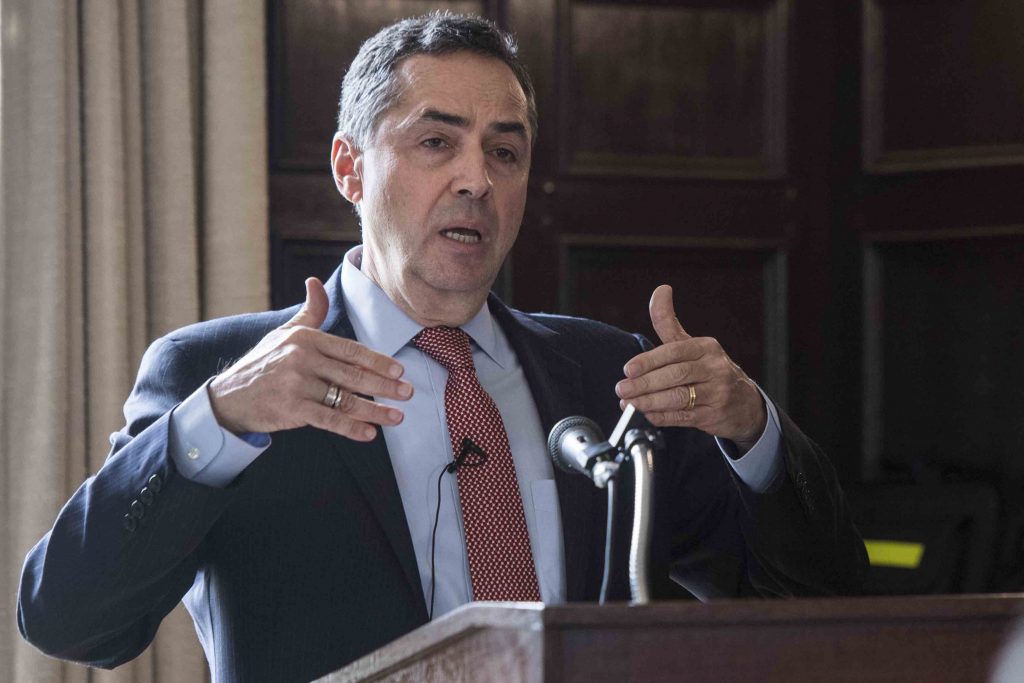Brazilian Supreme Court Justice Luis Roberto Barroso delivered the Clough Center for Constitutional Democracy’s Distinguished Lecture on Jurisprudence April 24, discussing the political importance that Supreme Courts have attained in creating policy and the new challenges they face as a result.
Supreme courts have contributed to an international judicialization of law, Justice Barroso said. Although he made the disclaimer that courts may not always get it right, the effect of this judicialization has generally been positive because it has advanced society.
United States constitutional practice became dominant after World War II. Contrary, for example, to the French version of 1789, which understood the constitution solely as a political document, the American model recognized a legal dimension of the constitution. The courts were to review and interpret the constitution. The constitution, not the parliament, was to have supremacy. The Supreme Court could invalidate acts by the executive and legislative branches.
And indeed, said Justice Barroso, this is happening increasingly in the United States and in the world where there has been an important transfer of power from political branches to the courts in the last years.
He offered examples. In Brazil, the Supreme Court created the framework that led to the impeachment of President Dilma Rousseff in 2015; it also declared the ban on gay marriage unconstitutional. In the United States, the Supreme Court validated gay marriage. In Israel, the court allowed the building of the wall on the border with the Palestinians. In South Korea, the court was instrumental in presidential impeachment, and in South Africa it struck down the death penalty.
Judicialization creates the need for the legitimization of these novel roles for courts, and also a review of the democratic nature of the courts’ actions.
Barroso described three overarching roles under which the decision-making of supreme courts can be subsumed. Supreme courts can assume counter-majoritarian, representative, and enlightened roles. Counter-majoritarian rights are generally exercised with great parsimony given that they infringe upon the powers of legislatures. In the United States, if the Supreme Court strikes down a law based on its constitutional review powers, it’s considered to be exercising a counter-majoritarian right. Barroso believes, however, that this need not be the case. In fact, courts play a very important role in democracies because they offer a venue for public debate.
As a matter of exception, and never as the rule, courts may be empowered to interpret political opinion, and interpret the constitution according to this understanding, Barroso said, listing numerous examples where courts reached decisions that were more representative of popular will than legislatures.
In Brazil, for instance, the court was tired of the inaction of the legislature, and declared that nepotism was unconstitutional, which corresponded to public opinion at the time. In a similar vein, in Canada the court recognized the fundamental right to abortion in 1988, the US Supreme Court struck down the criminalization of contraceptives in 1968 and overturned the ban on homosexual relations in 2003. These decisions were representative of popular opinion, and cannot be said to have been counter-majoritarian. For Barroso, “they might have been counter-legislative, but not counter-majoritarian.”
The courts also have the right to enlightened jurisprudence. Barroso pointed to numerous examples where courts had made decisions that had gone against the common sense of the time, but had proven to be in tune with the course of history. The abolition of slavery, the protection of women, homosexuals, and religious minorities cannot depend on the majoritarian processes, Barroso said. Therefore, courts often took it upon themselves to legislate enlightened decisions that went against public sentiment.
Barroso emphasized that the philosophy underlying his thought is not founded on Plato’s authoritarian ideas, but rather on Aristotelian good ideas and political measure. In the United States, courts have often assumed enlightened roles. He said the decision against segregation in Brown v. Board of Education of Topeka (1954) was arguably against the common sense of the time but very necessary. The courts also stopped the criminalization of miscegenation in Virginia, which was representative of northern views, but certainly not southern views. Barroso also regards Roe v. Wade as an enlightened decision.
Still, he reminded the audience Barat House, courts do not always get it right; the Dred Scott v. Sandford case of 1857 validated slavery. Nevertheless, for Barroso, “law has always been found at the intersection of reason,” and thus “courts have to be the guardians of reason.”
Barroso acknowledged that countries are at different stages, so courts need to exercise caution and carefully monitor the values of the society that they inhabit. They have to work with humility but also determination when they believe the cause is right.
Asked about the late Supreme Court Justice Antonin Scalia’s notion of constitutional originalism, which would preclude the enlightened interpretations Barroso suggested, the Brazilian jurist proclaimed his fundamental disagreement, saying the courts cannot abrogate their progressive role in society.
In summation, Barroso said that very often courts’ representative and enlightened decisions are mislabeled as counter-majoritarian, when they are really only counter-legislative. Courts have the duty to represent popular opinion or sentiments, he said, even, and, perhaps especially, when politicians are unable or unwilling to do so.


